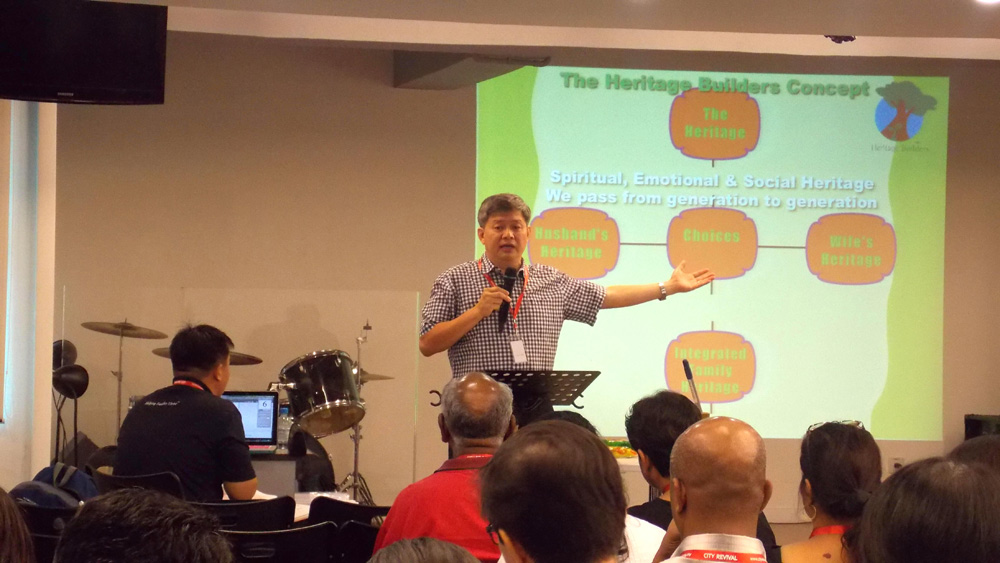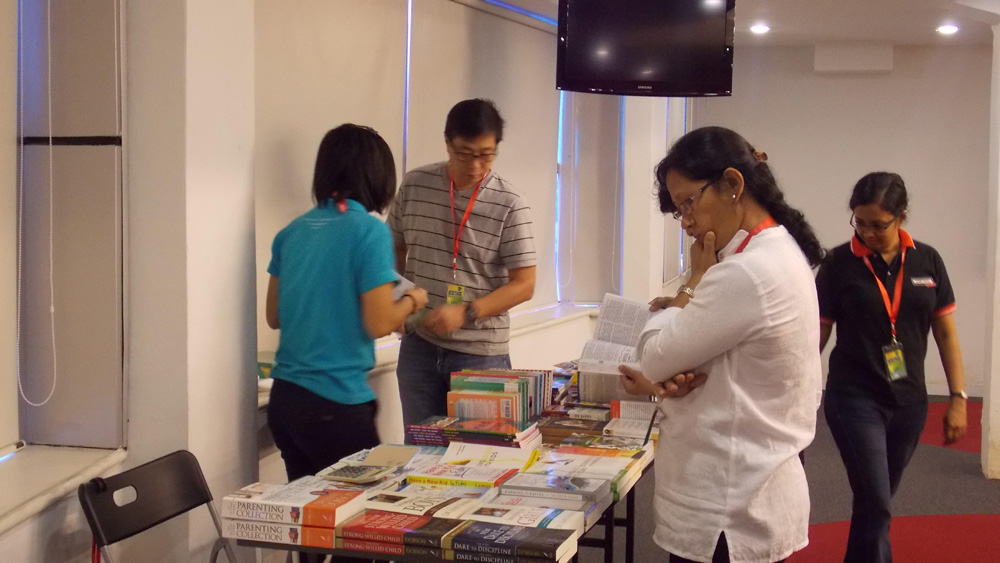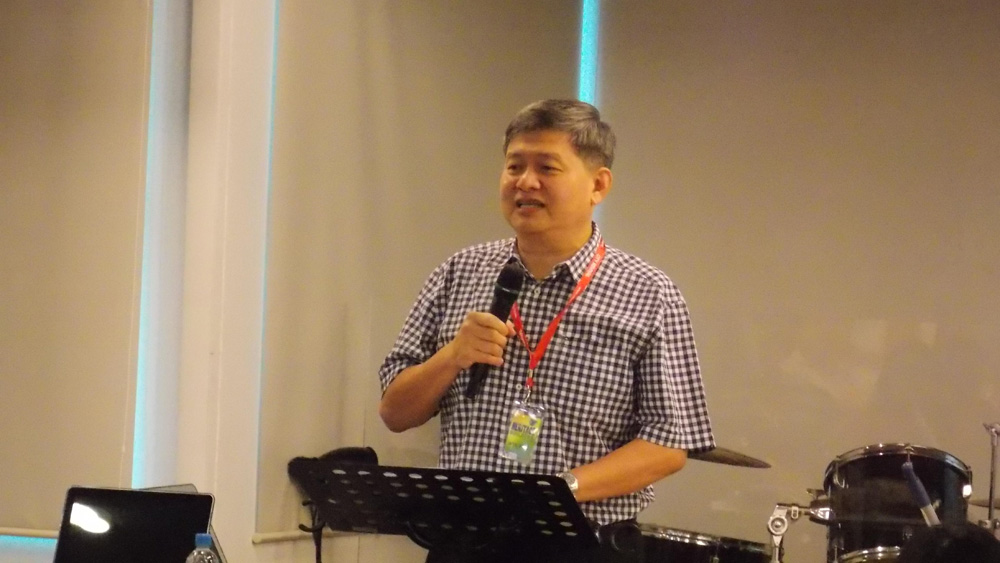
23 January 2013 by Natasha Kim-CM.
A Heritage Builder Seminar was held on Saturday at the City Revival Office. A good number of people attended on this day, mostly parents to listen to talks about how we can all build a family of faith. The speakers that were involved in this seminar were Mr. Lee Wee Min (Founder and Executive Director of Focus on the Family) and Mr. Joshua Liong (Curriculum Manager for Focus on the Family), both experienced in the field and very involved in Focus on the Family Malaysia.
In the focus of Heritage Builders, they believe in passing along a heritage of Christian faith to your family is a parent's highest calling. Their goal is to encourage and empower you in their great mission with practical resources and inspiring ideas that really work and help your children develop a lasting love for God.
Before the seminar began, Pastor Suresh Sundram began with an opening prayer dedicating the whole morning and afternoon to God’s hands.
Your Heritage (A Lasting Impression)
Deuteronomy 5:9-10: “…for I, the Lord your God, am a jealous God, punishing the children for the sin of the parents to the third and fourth generation of those who hate me, but showing love to a thousand generations of those who love me and keep my commandments.”
A heritage is an inheritance that is passed on from parent to child. Every heritage has three distinct, yet inter-related parts, like a cord with three strands, namely, spiritual, emotional and social heritage. This strand can either be positive or negative. Mr. Lee said, “As children grow up they start to develop their own individual personality. We’ve got parent calling in crying saying that their children do not want to connect with them anymore when they reach their teenage years, but it’s perfectly okay. At this stage parents need to start being coaches instead of just telling them what to do.”

The perfect time to train a child is when they are young and according to the Bible, young means before they reach the age of 12.
Our spiritual, emotional, and social heritage cord, ties us to the past, it gives us security in the present and a hope for the future. Below is a deeper look into the three :-
Spiritual Heritage is not
- Church attendance.
- Bible reading
- Formal religious instruction
Matthew 7:21: "Not everyone who says to me, 'Lord, Lord,' will enter the kingdom of heaven, but only he who does the will of my Father who is in heaven.
It is influenced far more by the parent’s actions and attitudes than by the roles and rules of instructions or by religious repetitions. It is more what we do than what we say. “By our actions, we model the spiritual elements in our lives for our world” said Mr. Lee.

Spiritual Heritage is
1) A process, not an event
- It can only be fully understood when we have experienced the cost involved in buiding one.
2) Modelled, not mandated
- It occurs in the routine moments in life
- It is transferred over dinner table conversations
- It’s demonstrated more in daily tasks than it is in weekly worship
Ephesians 5:1-2: 1 Follow God’s example, therefore, as dearly loved children 2 and walk in the way of love, just as Christ loved us and gave himself up for us as a fragrant offering and sacrifice to God
3) Preparation to clearly recognize the unseen realities of the spiritual life
Unfortunately, because these principles are unseen by all and uncomfortable for many, some parents neglect this vital aspect of passing a spiritual heritage to their children.
Romans 1:20 : For since the creation of the world God’s invisible qualities—his eternal power and divine nature—have been clearly seen, being understood from what has been made, so that people are without excuse.
Examples of positive indicators would be acknowledging and reinforcing spiritual activities and allowing them to view God as a personal, caring being who is to be loved and respected. Parents should also talk to their children about spiritual issues as a means of reinforcing spiritual commitments and to clarify timeless truth, the right from wrong and the good from bad. Lastly, parents should also incorporate spiritual principles into everyday living.

Emotional Heritage
An emotional heritage however is different; it is an enduring sense of security emotional stability, nurtured in an environment of safety and love. Mr. Lee compared this emotional heritage to a “stabilizer bar”. He said, “A Stabilizer bar is affixed somewhere on the suspension is a racing car which keeps the car from swaying excessively, while leaning into the horseshoe turn and most importantly, it keeps both sets of wheels firmly on the road. The key here is that the emotional element cord is like a racing car stabilizer bar: the emotions act as a stabilizer to the spiritual and social components.”
This is why some people are able to absorb and “emotional hit” better than others. If you are emotionally positive, one reason is that your parents as part of their heritage gave you a positive Emotional Heritage.
Remember that Spiritual, Emotional, and Social Heritage is interdependent. Each must support each other. Your children will be better of at coping if they are provided with a positive heritage. Give your child a place of rest and not rescue.
Proverbs 13:12: “Hope puts off makes the heart sick, but desire fulfilled is a tree of life.”
Proverbs 14:30: “A sound heart is the life of the flesh, but envy the rottenness of the bones.”
Proverbs 17:22: “A merry heart does good like a medicine, but a broken spirit dries the bones.”
Social Heritage
If you want them to become great teachers, teach them the 3 R’s for the home namely, respect for self, respect for others, and responsibility for their own actions. The most significant skill one can give their child is not academic or business wise but the fine art of relating to people.
Proverbs 11:3: “The integrity of the upright shall guide them; but the crookedness of traitors shall destroy them.”
Proverbs 12:18: “There are those who speak like the thrusts of a sword but the tongue of the wise heals.”
Proverbs 12:25: “Heaviness in the heart of a man makes it stoop, but a good word makes it glad.

In order to cultivate a good social heritage, one must start looking at the four elements that play a big role in building them up namely, respect, responsibly, love and acceptance, and of course boundaries.
1) Respect
At an early age respect must be taught. It begins with a healthy respect for self as a parent. This helps your children to develop their own positive self image to in return respect themselves. Besides that, respect for property will help them develop a respect for others. And teaching them the importance of respect for their own bodies as special creations of God, this ultimately helps children not to look down on others with disabilities.
2) Responsibility
In terms of responsibility, it can be easily impart to children by teaching them respect for themselves by assigning them duties within the family. This gives children the chance to see that their unique gifts fill a key role within the family and it allows them to learn to be responsible for all their actions.
3) Love and Acceptance
Caring parents need to let their children suffer the consequences of inappropriate behaviour as it teaches them both respect and responsibility. In this case, parents must verbalize or demonstrate love to their children with no strings attached. Such love, the kind that says, “I love you no matter what” contributes to strong healthy relationships, not only among the family but with numerous other people in the future as well.
- Balance unconditional love with conditional acceptance of behaviour.
- When children are disobedient, parents should not hold them back from the natural consequences of their wrongful behaviour.
Proverbs 27:5: “Open rebuke is better than secret love.”
4) Boundaries
Social boundaries should include how children should relate to God, as well as to authority, their peers, their environment and their siblings. Boundaries must be set for children to grow, feel secure and have direction, but they must come within a relationship.
Proverbs 14:34: “Righteousness lifts up a nation, but sin is a shame to any people.”
Proverbs 15”10: “Correction is grievous to him who forsakes the way; he who hates reproof shall die.”
Proverbs 22:6: Train up a child in a way he should go; and whe he is old, he will not depart from it.”
Breaking the Cycle
The good news is that the generational cycle can be broken. Firstly, you have to look back at your own heritage given to you in the past and choose which ones you would like to pass on to your children. This course of action can change rags to robes and gowns.
Then look around and then up by addressing unresolved issues to confront whether it is bitterness to confess, fears to overcome, personal weaknesses to admit, painful truths to acknowledge and more if there is.
Lastly, do not look down at these but instead look ahead. By identifying the problems of the past, the Lord can then help you confront any unresolved issues and let the changes begin. It is time to create the pattern for your own gown.


Leave a Reply